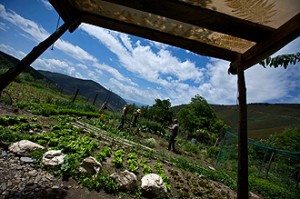
fund can be used by companies to explore if food zones identified overseas are suitable for investment of capital. (Photo: AP)
Straits Times | Aug 1, 2009
More farm area, funds to be set aside to guard against global shortages
By Jessica Lim MORE land will be set aside for growing food while companies will be encouraged to work with farms overseas to ensure that Singapore has a ready and stable supply of produce. With the turbulence in food prices in recent years exposing the island state's vulnerability, these moves should mitigate supply shortages and sharp price increases in the long term. 'Local farming can serve as a strategic stockpile, like Newater,' said National Development Minister Mah Bow Tan in a speech at the Agri-Food and Veterinary Authority's food safety awards on Friday night. More space for farms will be obtained by expanding existing farms or setting aside unused land parcels. It has been projected that over the next five years, the local supply of eggs should rise from 23 per cent to 30 per cent, fish from 4 per cent to 15 per cent and leafy vegetables from 7 per cent to 10 per cent. A fund, the amount of which is not yet known, will be available for farmers to tap for upgrading and expansion. It can also be used by companies, such as those involved in import and distribution, to explore if food zones identified overseas are suitable for investment of capital. Singapore now imports more than 90 per cent of its food, and the zones will be identified for six key imports - chicken, pork, fish, eggs, leafy vegetables and rice. Companies will be encouraged to work with growers to farm specifically for Singapore, in addition to their local communities. 'We want to encourage our companies to increase their participation in the entire value chain from food production to distribution, to better secure supplies,' said Mr Mah. Importers now cast a wide net, working with suppliers from over 30 countries. But these growers also supply to the rest of the world, so when there is a shortage, such as that just last year, a bidding war ensues. Singapore hopes to bypass such a scrap with its own assured supply. 'As Singapore imports most of its food, we are vulnerable to sharp changes in food supply and prices,' added Mr Mah. 'More needs to be done as we prepare ourselves to face the longer-term challenges affecting global food supply and demand.' It is hoped that these new measures will prevent a repeat of the price inflation for food items that hit Singapore around this time last year. The situation sent the authorities scrambling to secure new lines of supply. An inter-agency committee was set up to study and review food supply policies. The new recommendations have sprung from that. Manufacturers have welcomed the proposals. Mr Thomas Pek, managing director of home-grown soya sauce manufacturer Tai Hua, which imports up to 2,000 tonnes of soybeans a year, said his product went up in price last year following a shortage of the main ingredient.










